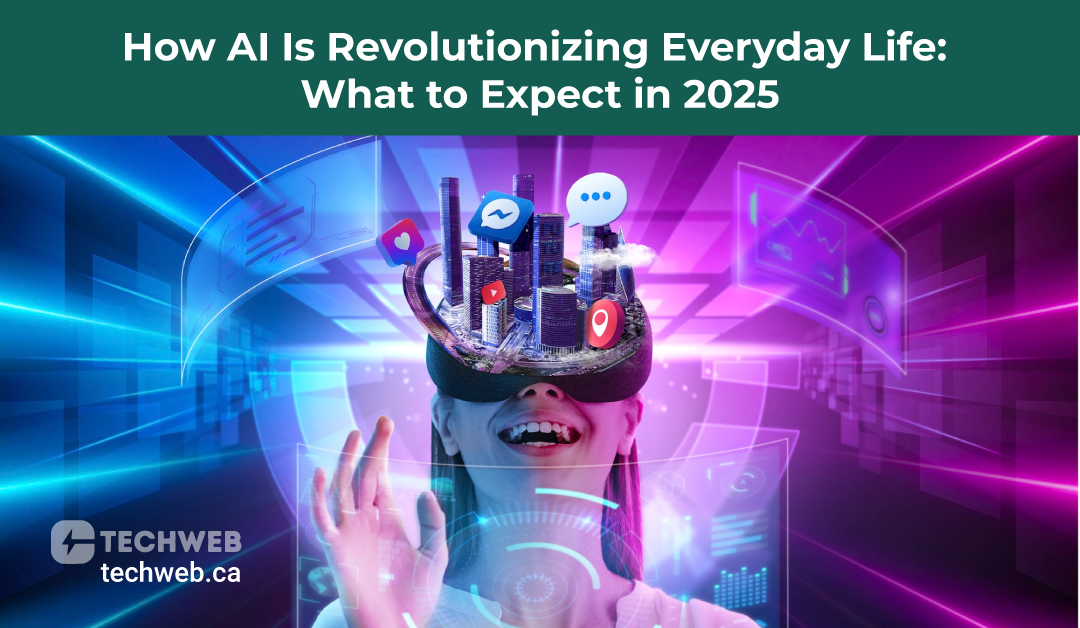Here’s a closer look at how AI is revolutionizing everyday life and what we can expect in the near future.
1. Smarter Homes for Smarter Living
AI-powered smart homes are no longer a luxury but a growing necessity. With advanced AI systems, smart devices can now predict your needs before you even realize them. Imagine your thermostat adjusting the temperature based on your preferences without you lifting a finger, or your refrigerator suggesting recipes based on the ingredients you have. In 2025, we can expect:
-
Enhanced Voice Assistants: AI assistants like Alexa, Siri, and Google Assistant will become more conversational and context-aware, offering proactive suggestions.
-
Energy Efficiency: AI will optimize energy usage by analyzing patterns, reducing waste, and lowering utility bills.
-
Integrated Ecosystems: Smart home devices will work in harmony, creating a unified and intuitive living experience.
2. Personalized Healthcare and Wellness
Healthcare is one of the sectors most profoundly impacted by AI. With advanced algorithms and machine learning models, AI is driving personalized care and improving overall wellness. By 2025, we’ll see:
-
Predictive Diagnostics: AI will analyze medical histories and genetic data to predict potential health issues, enabling early intervention.
-
Wearable Technology: Devices like smartwatches and fitness trackers will leverage AI to provide real-time health insights and personalized recommendations.
-
Virtual Healthcare: AI-powered chatbots and virtual assistants will make healthcare more accessible, providing instant medical advice and reminders for medication.
3. Revolutionizing Transportation
AI is steering the future of transportation, making it safer, faster, and more efficient. Autonomous vehicles and AI-driven traffic management systems are set to redefine how we travel. In 2025, expect:
-
Widespread Autonomous Cars: Self-driving cars will become more common, offering enhanced safety features and convenience.
-
AI-Optimized Public Transit: AI will improve scheduling, route optimization, and passenger experience in public transportation systems.
-
Smart Traffic Management: AI-powered systems will reduce congestion and improve road safety by analyzing traffic patterns in real time.
4. Transforming Work and Education
AI is reshaping the workplace and the classroom, creating new opportunities for learning and collaboration. In 2025, we can anticipate:
-
AI-Powered Learning: Educational platforms will use AI to provide tailored learning experiences, addressing individual strengths and weaknesses.
-
Virtual Workspaces: AI will enhance remote work by facilitating seamless collaboration, automating routine tasks, and providing real-time insights.
-
Job Creation in AI Fields: While some jobs may become automated, AI will also create new roles in data science, machine learning, and AI ethics.
5. Elevating Entertainment and Retail Experiences
AI is transforming how we shop and consume entertainment, offering highly personalized experiences. By 2025, we’ll see:
-
AI-Driven Recommendations: Streaming platforms and online retailers will use AI to deliver hyper-personalized suggestions based on user preferences.
-
Immersive Gaming and AR/VR: AI will enhance gaming and virtual reality experiences, creating more realistic and engaging environments.
-
Customer Service Chatbots: Retailers will deploy AI chatbots capable of handling complex queries and providing instant assistance.
6. Addressing Challenges and Ethical Considerations
While AI offers tremendous benefits, it also raises important ethical and societal questions. In 2025, we must address:
-
Data Privacy: Ensuring that AI systems handle personal data responsibly and transparently.
-
Bias in AI: Eliminating biases in AI algorithms to promote fairness and inclusivity.
-
Job Displacement: Mitigating the impact of automation on jobs and providing reskilling opportunities.
Conclusion
The year 2025 marks a pivotal moment in the AI revolution. As AI continues to integrate into every facet of life, it holds the promise of making our world smarter, more efficient, and more personalized. However, as we embrace these advancements, it is crucial to address the ethical challenges they bring. By doing so, we can ensure that AI serves as a force for good, enhancing our quality of life and paving the way for a brighter future.
The revolution is here, and it’s only just beginning. Stay updated with the latest in AI and tech innovation at TechWeb.ca.

